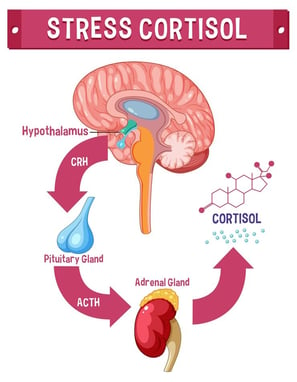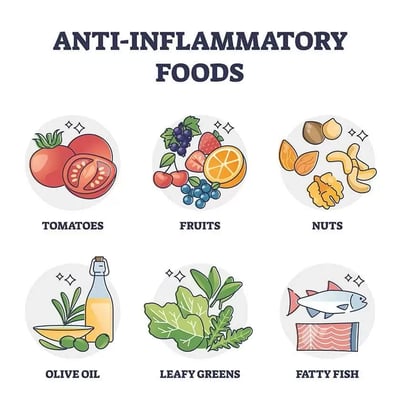Feeling Stressed? Your Cortisol Levels Might Be to Blame!
Feeling overwhelmed and exhausted? Your stress hormone, cortisol, might be running wild! Discover how it impacts your mind and body—and learn simple ways to keep it in check.
LIFESTYLE
Deepita
4/1/20256 min read


Sometimes, stress hits harder than usual—we overthink, everything feels off, and we start questioning if we’re slipping into depression. But is it really a mental health issue, or could it be something deeper happening inside our bodies? The answer might lie in a powerful hormone: cortisol—your body’s natural stress responder. Let’s dive into how it affects your mood and what you can do to regain balance.
What is Cortisol and How Does it Affect You?
Cortisol is a steroid hormone produced by your adrenal glands, playing a crucial role in your fight-or-flight response. It helps regulate metabolism, immune response, and blood pressure, but when levels are too high for too long, it can lead to chronic stress, anxiety, and even physical health issues.
While short-term cortisol spikes help us deal with immediate stress, long-term elevation can disrupt sleep, cause weight gain, weaken immunity, and impact mental well-being.
While cortisol levels fluctuate throughout life, some age groups are more vulnerable to its negative effects:
18-35 years (Young Adults): More prone to high cortisol due to career pressure, academics, relationships, and financial stress.
35-50 years (Middle Age): Work-life balance, family responsibilities, and health concerns contribute to chronic stress.
50+ years (Older Adults): Age-related health conditions, financial security, and loneliness can lead to prolonged cortisol elevation.
Early Signs of High Cortisol
Recognizing early symptoms of high cortisol levels can help prevent long-term health issues. Be mindful of the following signs:
Persistent fatigue and brain fog –Cortisol helps regulate energy levels, but when it stays high for extended periods, it can leave you feeling drained. Chronic fatigue sets in, making even simple tasks feel exhausting. Additionally, high cortisol affects cognitive function, leading to brain fog, difficulty concentrating, and memory issues. If you constantly feel mentally sluggish, even after a full night's sleep, cortisol might be the culprit.
Trouble Sleeping or Waking Up Exhausted –Under normal conditions, cortisol follows a daily rhythm—peaking in the morning to wake you up and lowering at night to help you sleep. However, when levels remain high, this cycle is disrupted, making it harder to fall asleep or stay asleep. Even if you do sleep, you may wake up feeling unrefreshed, leading to a vicious cycle of stress and exhaustion.
Increased anxiety, irritability, or mood swings – Since cortisol is linked to the body’s fight-or-flight response, excessive levels can lead to heightened anxiety and mood instability. You might find yourself feeling restless, easily overwhelmed, or irritated by minor inconveniences. Mood swings become more frequent, making it hard to manage emotions effectively.
Frequent headaches and muscle tension –When cortisol remains elevated, your body stays in a state of tension, often leading to headaches and tightness in the neck, shoulders, and jaw. This prolonged muscle strain can contribute to chronic pain, migraines, or tension headaches, especially at the end of a stressful day.
Cravings for sugary or salty foods – Cortisol plays a role in appetite regulation, and high levels often trigger cravings for high-sugar and high-salt foods. This happens because your body is trying to replenish energy stores to deal with prolonged stress. Unfortunately, giving in to these cravings can lead to unhealthy eating patterns, energy crashes, and weight gain.
Unexplained weight gain, especially around the belly – Excess cortisol encourages fat storage, particularly in the abdominal area. Even if you maintain a healthy diet and exercise routine, high cortisol levels can make it difficult to lose weight. If you notice stubborn belly fat that wasn’t there before, chronic stress might be playing a role.
Weakened immune system – Cortisol suppresses immune function, making you more susceptible to infections. If you’re getting sick more often, struggling with slow wound healing, or experiencing frequent colds, it could be a sign that your body’s immune defenses are weakened due to prolonged stress.
Irregular Menstrual Cycles or Hormonal Imbalances - Cortisol can interfere with reproductive hormones, leading to irregular periods, missed cycles, or worsened PMS symptoms. Women with consistently high cortisol may experience hormonal imbalances affecting fertility, mood, and overall well-being. Additionally, it can contribute to acne, hair thinning, or thyroid dysfunction, further disrupting hormonal stability.
If these symptoms persist, it may be a sign of prolonged cortisol elevation, requiring lifestyle changes or medical attention.
How to Lower Cortisol and Regain Balance
If you’re experiencing symptoms of high cortisol, the good news is that you can take steps to lower it and restore balance. Here are some effective ways to regulate cortisol levels naturally:
Prioritize Quality Sleep - Lack of sleep can keep cortisol levels elevated, leading to fatigue, irritability, and stress. Aim for 7-9 hours of restful sleep each night by sticking to a consistent bedtime routine, avoiding screens before bed, and creating a dark, quiet, and comfortable sleep environment. Relaxation techniques like deep breathing or meditation can also help prepare your body for rest.
Practice Stress-Reducing Activities- Chronic stress is the biggest trigger for high cortisol, so finding ways to relax is essential. Mindfulness meditation, deep breathing exercises, and yoga can help lower cortisol by calming the nervous system. Spending time in nature, engaging in hobbies, and practicing gratitude can also provide mental relief and improve overall well-being.
Exercise—But in Moderation- Regular physical activity helps regulate cortisol, but over-exercising can have the opposite effect. Low- to moderate-intensity exercises like walking, swimming, and strength training can reduce stress, while excessive high-intensity workouts may actually increase cortisol. Finding the right balance is key to maintaining both physical and mental health.
Eat a Balanced, Anti-Inflammatory Diet - Nutrition plays a major role in cortisol regulation. Eating a diet rich in whole foods, lean proteins, healthy fats, and complex carbohydrates can help stabilize blood sugar and reduce stress. Foods high in magnesium (like spinach and almonds), omega-3s (like salmon and flaxseeds), and antioxidants (like berries and green tea) support hormonal balance. Avoid excessive caffeine, processed foods, and sugar, as they can contribute to cortisol spikes.
Get Sunlight and Maintain a Healthy Circadian Rhythm - Natural sunlight exposure helps regulate cortisol and supports better sleep quality. Try to get at least 15-30 minutes of morning sunlight each day, which helps align your body’s internal clock. In the evening, limit blue light exposure from screens and establish a relaxing nighttime routine to encourage melatonin production and improve sleep.
Connect with Loved Ones- Strong social connections can significantly lower cortisol levels. Engaging with family, friends, and loved ones provides emotional support and reduces feelings of isolation and stress. Activities like laughing, talking, and even simple acts of kindness help release oxytocin, a hormone that counteracts cortisol.
Consider Supplements (With Medical Guidance)- Certain natural supplements may help regulate cortisol and support stress management. Ashwagandha and Rhodiola Rosea are adaptogenic herbs known for their calming effects, while magnesium and omega-3 fatty acids support relaxation and reduce inflammation. Always consult a healthcare provider before adding supplements to your routine to ensure they are safe and effective for your specific needs.
Stress is inevitable, but chronic stress doesn’t have to control your life. By understanding how cortisol affects your body and taking proactive steps, you can regain balance, improve mental well-being, and live a healthier, happier life.
If stress feels unbearable, don’t hesitate to reach out to a health professional—your well-being is worth it.


















